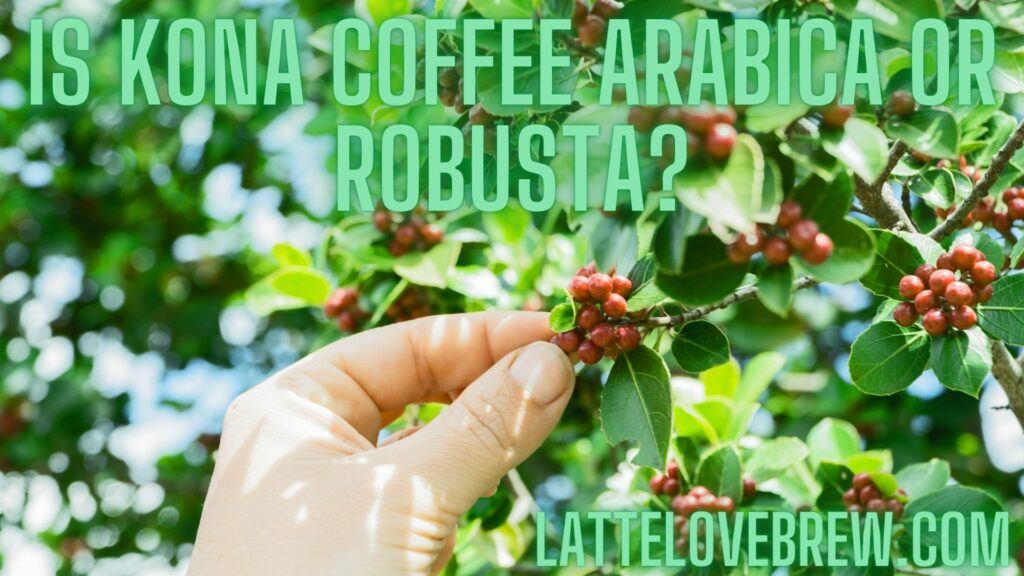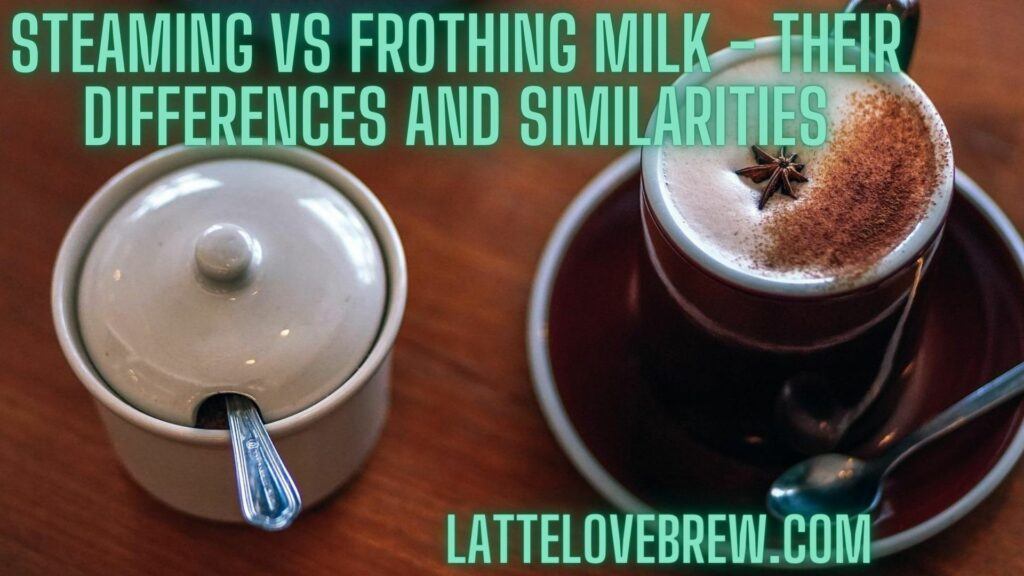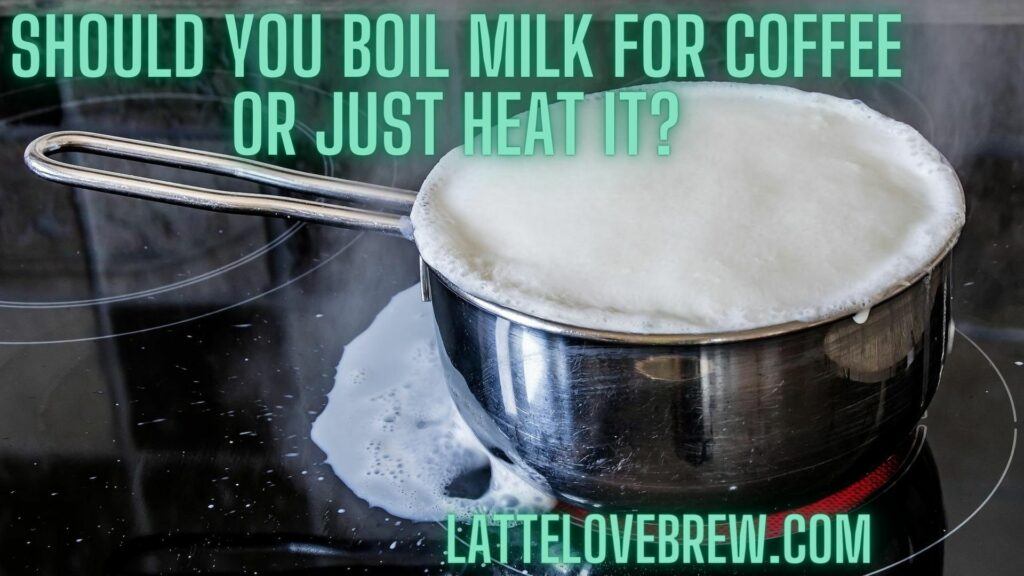Last updated on March 3rd, 2024 at 11:42
Having been on many coffee plantation tours in Hawaii, by far the most common question asked is “Is Kona coffee Arabica or Robusta?” by the hundreds and thousands of tourists.
Rather than leave you hanging and drag this out, I’ll tell you which coffee bean lends its rich flavors to Kona coffee, and what bean Hawaiian coffee farmers use, it’s Arabica.
A 100% Kona coffee uses Arabica coffee beans.
Let’s dig down and talk a lot more about Kona coffee, coffee farming and growing coffee for the coffee lovers (like me) that love to grow coffee plants!
Is The Kona Coffee Plant Arabica Or Robusta?
Table Of Contents
- 1 Is The Kona Coffee Plant Arabica Or Robusta?
- 2 Where Are Kona Coffee Plants Grown? Where Is Kona Coffee Grown?
- 3 How Big Do Kona Coffee Plants Get?
- 4 How Long Does A Coffee Plant Take To Grow?
- 5 Kona Coffee Flavor Profile
- 6 Why Does Kona Coffee Taste So Good?
- 7 Is Kona Coffee Good For Espresso?
- 8 What Is The Best Brewing Method For Kona Coffee?
- 9 Kona Coffee Price – Is Kona Coffee Worth It?
- 10 Why Is Kona Coffee So Expensive?
- 11 Frequently Asked Questions About Is Kona Coffee Arabica Or Robusta
- 11.1 What Is The Difference Between Kona And Arabica Coffee?
- 11.2 What Is So Special About Kona Coffee?
- 11.3 How Do I Know If My Coffee Is Arabica Or Robusta?
- 11.4 What Are The Different Types Of Kona Coffee?
- 11.5 What Is The Difference Between Kona Coffee And Regular Coffee?
- 11.6 Which Country Has The Best Robusta Coffee?
- 12 Frappé-Ing It All Up – Is Kona Coffee Arabica Or Robusta?
All the coffee farms in the Kona Coffee region, both North and South Kona, grow Arabica coffee trees. To be exact, it is the Guatemalan Typica, a particular strain of the coffea Arabica tree. Notably, Hawaiian coffee farmers are starting to grow other strains of the Arabica coffee tree in the Kona region.
Only coffee that is 100% Kona coffee is 100% Arabica. There are some variations that are a blend of coffee beans and have a percentage of Robusta to increase the caffeine content.

Read: Hawaiian coffee brands
Where Are Kona Coffee Plants Grown? Where Is Kona Coffee Grown?
Kona Coffee plants are grown on the Big Island of Hawaii. Despite the rich history of generational and intergenerational coffee farming on the volcanic soil of the Kona region, coffee is not native to Hawaii. The first coffee plantations were brought to Hawaii via Brazil, with the first American Coffee being planted in the Manoa Valley of Oahu.
Kona coffee is the jewel in the American coffee crown, if not the world as it is one of the most prized coffees in the world.

Read: What does Kona mean?
How Big Do Kona Coffee Plants Get?
How tall a fully mature Kona coffee tree can grow is a great question! Of the Kona Coffee Farms that I visited in the kona coffee belt, the average height was 15 feet tall, which is about 4.5 meters.
According to the Royal kona estate kona coffee farm the coffee plants can produce high quality coffee if well taken care of for up to 60 years.
If they are not at all well taken care of, you can expect the plant to produce coffee cherries of good quality for half that time.

How Long Does A Coffee Plant Take To Grow?
It will take around 3 to 4 years for your coffee plants to grow to their full height and start to grow coffee cherries that you can harvest, process and get ready for roasting.
At this point, once processed, the moisture content is high and needs to be dried at a constant temperature prior to roasting.
Kona Coffee Flavor Profile
The flavor profile of Kona coffee is sweet, light bodied, fruity and has subtle hints of nuts or spice. The lighter roasts enjoy a brighter flavor profile.
As a Kona coffee bean is roasted, the first flavors it picks up are the fruity flavors and the sweet hints of fruit. As you progress through the roast profiles, you get less of a fruity flavor and more of a deeper body.
Why Does Kona Coffee Taste So Good?
Kona Coffee tastes so good and has a great flavor profile due to the environment where the Kona coffee tree grows.
The volcanic soil in which they grow is rich in nutrients and is very fertile. The Kona mountains provide a perfect climate for the growing and cultivation of coffee with the right temperature with ample sunshine and rain.
Is Kona Coffee Good For Espresso?
Yes,
you can make a great and rather tasty espresso with Kona coffee beans. You will need a dark roast, ideally from Hula Daddy, due to having a good amount of oil. Alternatively, look at a dark roast or medium dark roast from any of the brands from the Hawaii coffee company.
To get a great espresso with a rich crema on top, you will need fresh coffee beans and ones with ample oil as well as the correct 9 bar pressure to produce that long-lasting crema that coffee lovers and espresso lovers enjoy.
The ability to get a great espresso from Kona Coffee beans means you can make a number of espresso based drinks like a cortado, latte, macchiato, cappuccino, flat white and more.

What Is The Best Brewing Method For Kona Coffee?
Kona coffee is fantastic regardless of which roast you buy, be it a lighter roast or a darker roast. The best brewing technique and brewing method to bring out the bright flavor profile and the tasty and dark and delicious profiles are the slow brewing methods that extract the coffee oils and flavor compounds.
I suggest French press, cold brew, pour over or Chemex as a brewing method for brewing Kona coffee. If you are using pour over or Chemex I highly recommend that you use a metal filter over a paper or cotton cloth filter to allow the natural oils from the coffee to seep into your cup of coffee.
Kona Coffee Price – Is Kona Coffee Worth It?
Yes,
Kona coffee is worth it. As a coffee lover and coffee enthusiast, trying a variety of volcanic coffees is a must. If money is an issue, and you are unwilling to push the boat out on this one, think of it as a one-off expense as there is no need or obligation to make it your regular coffee of choice and buy it monthly.
100% Kona Coffee is one of the most expensive coffees that you will find and undoubtedly the most expensive on a per-region basis.
On average, when making a cup of Kona coffee at home, will work out at US$1.25 to US$2.00 per cup. The retail price of a good quality Kona coffee per pound (454 grams) ranges from US$10 to US$70 at the current price for the very best quality.
Coffee snobs often turn their noses up at and smirk at Kona coffee. For one reason or another, over the past decade, it has become less popular amongst coffee geeks. Probably for economic reasons or the fact it is very difficult to get a cup of Kona Coffee in a specialty gourmet coffee shop these days – again the reason being economics.
Why Is Kona Coffee So Expensive?
Kona coffee is so expensive for a number of reasons, one being simple market factors and economics. Less than 1% of the coffee grown in the world is Kona Coffee and the area in which Kona coffee is grown is tiny – only 30 square miles which makes it unique and limited, always will be for those reasons.
Coffee production and harvesting is very labor-intensive and is hand-picked. Kona, well, we are talking about US labor costs and not African, Asian or Latin American like the other coffee producing nations.
Add to this the geographic location where everything has to be shipped by ocean barge. The location on the Hawaiian islands also means additional distribution costs.
A short supply and a high demand for the specialty beans also pushes up the price. Unless there is a coffee market crash, I wouldn’t expect the price to drop any time soon.
Frequently Asked Questions About Is Kona Coffee Arabica Or Robusta
What Is The Difference Between Kona And Arabica Coffee?
To be clear, Kona coffee is arabica coffee. Arabica coffee is a particular type or species of coffee bean that is more flavorful and of a higher quality than Robusta beans. Kona coffee is in reference to the location in which the coffee comes from. Kona coffee is grown in mineral rich volcanic soil and the perfect climate near the Kona mountains. They produce a rather exquisite flavor.
What Is So Special About Kona Coffee?
Kona coffee is very special due to being one of the rarest coffees that meet the highest standard, the specialty coffee grade. Kona coffee farms cover a very small area that is approximately 30 square miles. The prime location and production process produces one of the best tasting coffees that is an American coffee.
The taste is sweet, delicate, fruity with nutty and spicy notes.
How Do I Know If My Coffee Is Arabica Or Robusta?
A simple visual check should tell you what type of coffee bean you have. Robusta coffee beans are shorter and rounder than their larger, and oval shaped Arabica coffee beans. If you are still struggling, brew a cup of coffee. Arabica coffee beans produce a sweeter and smoother cup of coffee with berry and fruity notes.
Robusta coffee has a stronger and more bitter taste that is harsher.
What Are The Different Types Of Kona Coffee?
There are a few different types of coffee that belong to the Kona coffee crop which are from the highest grade to the lowest:
- 1. Extra Fancy.
- 2. Fancy.
- 3. Kona #1
- 4. Prime.
- 5. Blend.
The Kona #1 is the type of kona that is used in restaurants. A Kona blend, please avoid this if you want to enjoy a legit Kona coffee. Only 10% of the beans used are Kona, the rest is made up of cheap coffee beans. Anything from Number 3 and up, and you are getting a good Kona.
What Is The Difference Between Kona Coffee And Regular Coffee?
The biggest difference between Kona coffee and regular coffee is the quality. Kona coffee is of higher standard and meets the specialty grade standard. Kona is also different due to belonging to the unique family of volcanic coffees.
The biggest difference is the way in which they are processed. Kona coffee is processed to the highest standards and detail including being handpicked. The overall process produces a notably more flavorful cup of coffee.
Which Country Has The Best Robusta Coffee?
Having spent 3 years in the Asian nation I can absolutely and personally assure you that Vietnam coffee farmers, particularly those from the central highlands and the Da Lat and Dak Mill area. If you want a very good Robust a coffee look for Vietnamese coffee from those areas.
Frappé-Ing It All Up – Is Kona Coffee Arabica Or Robusta?
100% Kona coffee is Arabica coffee and not a robusta. Although coffee farmers in the region are trying out and experimenting with other varieties of the Arabic coffee plant due to the low flavor profile of Robusta coffee, I am not at all expecting any of them to switch completely from Arabica to Robusta and will remain as Arabica, literally forever.
If your friend is curious about Kona coffee or has that question is Kona coffee Arabica or Robusta whizzing around their head then send them this article.
Join our cool coffee community and share great coffee recipes, astounding latte art, recipes and hilarious coffee memes and jokes. Find us on Facebook/Meta.







